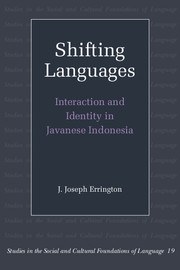Book contents
- Frontmatter
- Contents
- List of figures, maps, and tables
- Acknowledgements
- Preface: suggestions for use
- Note on orthography and transcription
- Map 1 The Indonesian archipelago
- Map 2 Eastern Central Java
- 1 Introduction
- 2 A city, two hamlets, and the state
- 3 Speech styles, hierarchy, and community
- 4 National development, national language
- 5 Public language and authority
- 6 Interactional and referential identities
- 7 Language contact and language salad
- 8 Speech modeling
- 9 Shifting styles and modeling thought
- 10 Javanese–Indonesian code switching
- 11 Shifting perspectives
- Notes
- Works cited
- Index of javanese and indonesian words
- General index
- Titles in the series
6 - Interactional and referential identities
Published online by Cambridge University Press: 01 June 2011
- Frontmatter
- Contents
- List of figures, maps, and tables
- Acknowledgements
- Preface: suggestions for use
- Note on orthography and transcription
- Map 1 The Indonesian archipelago
- Map 2 Eastern Central Java
- 1 Introduction
- 2 A city, two hamlets, and the state
- 3 Speech styles, hierarchy, and community
- 4 National development, national language
- 5 Public language and authority
- 6 Interactional and referential identities
- 7 Language contact and language salad
- 8 Speech modeling
- 9 Shifting styles and modeling thought
- 10 Javanese–Indonesian code switching
- 11 Shifting perspectives
- Notes
- Works cited
- Index of javanese and indonesian words
- General index
- Titles in the series
Summary
A useful way to broach the give-and-take of everyday conversational life is through the commonest Javanese Indonesian ways of speaking of the persons who are parties to speech. These involve kin terms and personal pronouns, which Javanese commonly use to refer to speaker and addressee, participants in the interaction in which uses of both kinds of terms figure. These aspects of talk are thus bound indexically and referentially to interactional process and self /other relations. For that reason they can throw a narrow but revealing light on Indonesian's entry into formerly monolingual Javanese interaction and communities.
Javanese and Indonesian kin terms, like those in many other Southeast Asian languages, are commonly used to speak of persons spoken to and bring an idiom of siblingship and seniority into a broad range of interactional relations. Rather than try to catalog the full expressive range of these interactional resources, I present emergent, syncretic aspects of kin term use with an eye to two broader kinds of social change. Some kin terms which once counted as Javanese have effectively been Indonesianized through their tacit links with new, territorially grounded understandings of ethnic and national identity. A few other kin terms, distinctively foreign in provenance and urban in association, have entered urban usage as diacritics of new, class-linked statuses in Java and elsewhere. Both patterns of variation and change can be considered with an eye to the shifting modes of territoriality sketched in chapter 2.
- Type
- Chapter
- Information
- Shifting Languages , pp. 82 - 97Publisher: Cambridge University PressPrint publication year: 1998



